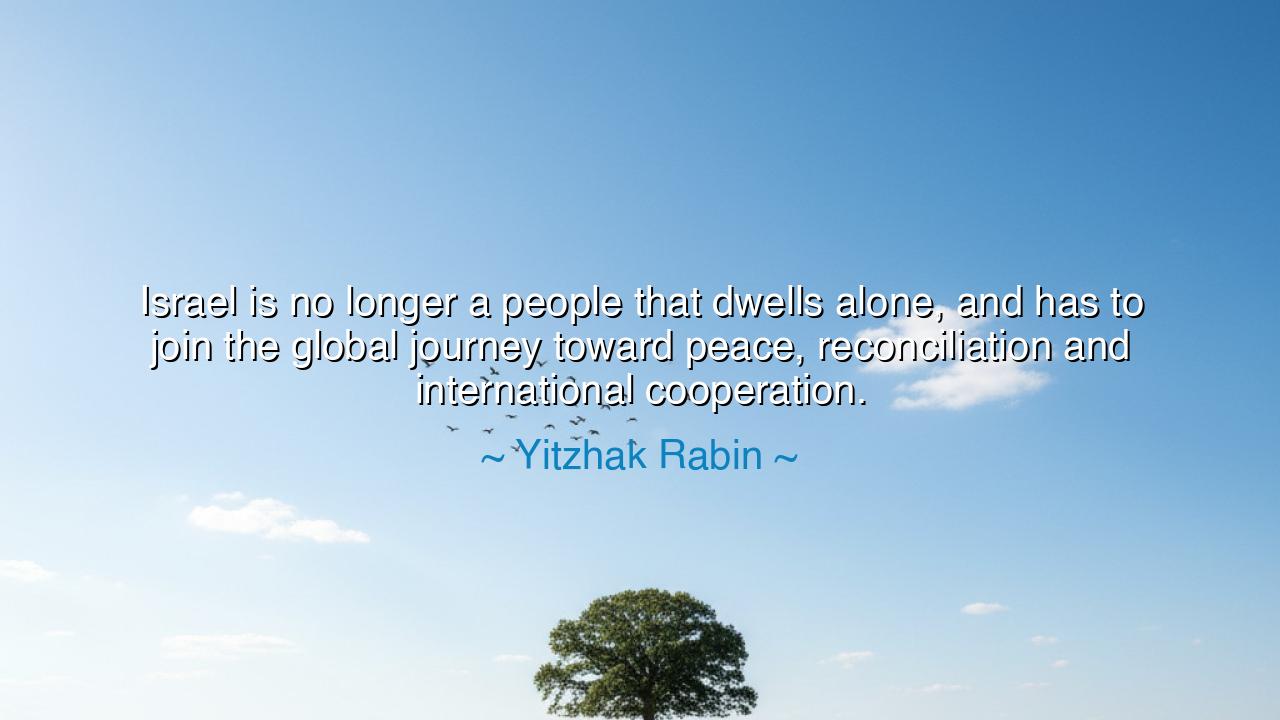
Israel is no longer a people that dwells alone, and has to join
Israel is no longer a people that dwells alone, and has to join the global journey toward peace, reconciliation and international cooperation.






In an age of swords and sorrow, when the land of prophets and kings still echoed with the cries of division, Yitzhak Rabin—soldier, statesman, and peacemaker—spoke these luminous words: “Israel is no longer a people that dwells alone, and has to join the global journey toward peace, reconciliation and international cooperation.” These words, uttered not in triumph but in solemn hope, marked a turning point in the long story of a people who had wandered through exile, persecution, and war. In them, Rabin proclaimed not the surrender of strength, but the awakening of vision—that even a nation born in struggle must one day learn the art of peace.
To understand his meaning, one must first remember the old phrase from the Book of Numbers: “Lo, the people shall dwell alone, and shall not be reckoned among the nations.” For generations, Israel lived by this idea—set apart, chosen, and often isolated by both faith and fate. Through centuries of exile and survival, the Jewish people learned to endure in solitude, to carry the flame of identity even when surrounded by darkness. But Rabin, standing amid the modern world, saw that such isolation could no longer be the destiny of his people. The age had changed; the nations were drawing together, not in conquest, but in cooperation. To dwell alone, he realized, was no longer a mark of purity, but a barrier to the promise of shared peace.
Born from the fire of conflict, Rabin was no stranger to war. He had seen the anguish of battle and the cost of division. But as the years ripened his understanding, he came to believe that true courage was not found only on the battlefield, but in the heart that dares to trust former enemies. His vision reached beyond borders and politics—it was the vision of a world where Israel could stand not as an island, but as a bridge among nations. When he shook the hand of Yasser Arafat on the White House lawn in 1993, the act was not mere diplomacy—it was a living symbol of what his words foretold: that reconciliation is the highest form of heroism.
Rabin’s statement speaks to the eternal tension between security and openness, between memory and renewal. Israel had learned to survive through vigilance, through strength, through standing alone when no ally could be trusted. But Rabin taught that survival is not the same as life. To live fully as a people, one must also extend the hand of friendship. He believed that the destiny of Israel—and of all nations—lay in partnership, in the shared responsibility of humanity to shape a peaceful world. His was a call to transcend fear, to see in the “other” not an enemy, but a reflection of one’s own humanity.
History is full of those who tried to build peace and paid the ultimate price. Like Abraham Lincoln, who sought to heal a nation torn by war, or Mahatma Gandhi, who preached unity and nonviolence amidst division, Rabin too was struck down by one of his own—a martyr to the very dream he preached. Yet his words did not die with him. They remain, inscribed in the conscience of a nation and in the heart of humanity, as a reminder that peace is a journey that outlives the traveler. The seed he planted still waits in the soil of time, yearning for the rain of understanding.
In his message lies a teaching not only for Israel, but for all peoples. No nation, no person, can dwell alone forever. The world is now a vast and trembling web, each thread touching the next. To close oneself off in pride or fear is to wither in isolation. Progress—whether of a nation or a soul—comes through connection, through the humble act of listening, forgiving, and building together. The walls that once protected us must now give way to bridges of cooperation, lest protection become imprisonment.
The lesson, then, is clear: to dwell alone is to remain incomplete. Whether in nations or in hearts, peace is born when we choose to engage rather than retreat, to reconcile rather than remember only wounds. Let each of us, in our own small way, take up Rabin’s call—to work for peace, to seek understanding, to build community where once there was distance. For as long as one heart believes in isolation, humanity remains divided; but when even one heart believes in fellowship, the light of reconciliation begins to dawn.
So remember, O listener: to join the “global journey toward peace” is not to abandon one’s identity—it is to fulfill it. As rivers flow together into the sea, so must nations and souls learn to converge without losing their essence. Rabin’s dream still calls to us from the echoes of history: that strength without compassion is hollow, and that only through unity can the scattered fragments of humanity be made whole again.






AAdministratorAdministrator
Welcome, honored guests. Please leave a comment, we will respond soon